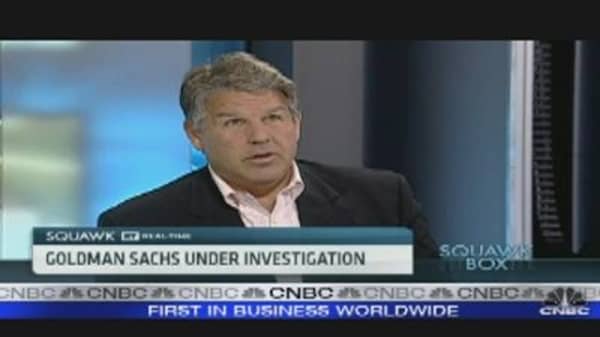The US government needs to focus on small business lending rather than Wall Street, the author of a new book about Goldman Sachs told CNBC Thursday.
“We’ve tried to fix Wall Street, now it’s time to focus on Main Street or pay the price,” William D. Cohan, author of "Money and Power: How Goldman Sachs Came to Rule the World", said.
His comments came after worse-than-expected US manufacturing and unemployment data increased fears of a further US slowdown.
“We’re continuing to struggle. Coming out of the US crisis of 2008, the US government pumped in trillions of dollars to try to re-equitise the banks, and they were hoping that it would trickle down into the greater economy as a whole", Cohan said.
“It’s re-equitised the banks, and they’re paying huge bonuses to their employees as a result, but it’s really not trickling down to the wider economy in an effective way.
“There is the failure of the banks to lend to small and local businesses which are the generators of future employment in the US,” he added.
There are too many “mixed messages” over proposed regulations following the Dodd-Frank act, Cohan believes. He thinks that the Fed may have to print money again.
“The Fed has very few arrows in its quiver left. Bernanke keeps on saying there’s more arrows in his quiver but I don’t know what they are at this point. QE3 might be one of those. The likelihood is it will have no choice but to do it again,” he said
“At some point you’ve got to deal with the chronic unemployment issue. Congress can’t just keep writing cheques, or we risk looking like Greece, and we don’t want to look like Greece.”
Goldman Sachs has been criticised by politicians on both sides of the Atlantic for its behaviour during the financial crisis.
“It certainly was smarter during this crisis. It’s in the DNA,” Cohan said. “They have better information, they have more information, they have more powerful friends. You’ve got to give them credit. They also saw the danger coming in the mortgage market and made a big proprietary bet against it.
“I spent 17 years working on Wall Street and no matter which firm I worked at every one of us wanted to be like Goldman Sachs, they just were the gold standard.”
He added that the investment bank, famously called a “vampire squid” by Rolling Stone magazine, also had its faults.
“Goldman has been in and out of trouble its whole existence. There is some nefariousness going on its background and I lay it out here. They’re not saints by any stretch of the imagination.
“When you write about GS in the post-vampire squid era if you’re not writing that they’re a vampire squid you immediately open yourself up to criticism that you’re in their pocket.
“I’m an investigative reporter. I just told the story of the firm with the information that’s out there,” he said.
Senator Carl Levin’s recent investigation into the credit crisis, which devoted 250 out of 600 pages to Goldman Sachs, raised the question of whether Goldman's chief executive Lloyd Blankfein perjured himself in front of the Senate Permanent Subcommittee on Investigations.
Questions have also been raised by US Senators about whether it was appropriate to have former Goldman head Hank Paulson in charge at the Treasury during the crisis.
“If the Secretary of the Treasury is not talking to the chief executive of Goldman Sachs during a financial crisis, the likes of which we haven’t seen in 75 years, then something is wrong,” Cohan said.
“Of course he was talking to Goldman Sachs, he was talking to the other banks as well. I don’t think they got any special treatment. Favourable treatment but nothing special.”




